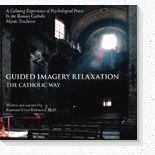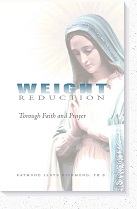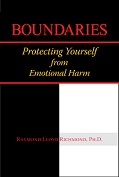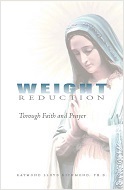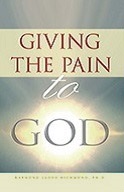|
|
|
When you
refuse to eat food your body does not need,
you are not depriving yourself,
you’re depriving temptation of its power over you. |
 |
Catholic Psychotherapy |
Spiritual Counsels |
Books |
About CSF
Introduction |
Body Mass Index Calculator |
A Symptom |
Beginning the Process |
Psychological Factors in Overeating |
General Facts About Weight Gain |
Weight Reduction Assisted by Fasting |
Weight Reduction through Faith and Prayer |
Visualization and Prayer Technique |
Coping with Cravings
 ERTAINLY, we all know that eating is necessary
for our survival. Yet consider the following: ERTAINLY, we all know that eating is necessary
for our survival. Yet consider the following:
• |
When you overeat,
you are really abusing and torturing your body with food it doesn’t need. |
•
|
Overeating afflicts
your body, the Temple of the Holy Spirit,
with medical problems such as back pain, high blood pressure, diabetes, and
heart disease. |
• |
Excess weight causes you
to bury your talents, wasting energy that could have
been used for productive labor. |
So the evidence is clear:
Overeating is a form of self-punishment. The underlying psychological mechanism
of this is anger, and there can be many reasons for your anger, as will be described
below, but knowing this, and yet continuing to care more about the illusion of
“feeling good” than you care about the welfare of your body and soul, is a
sad mistake.
Body Mass Index
Calculator
Enter your weight and height
and click on the button to calculate your
Body Mass Index: |

|
•
|
This index assumes
that excess mass is the result of body fat. If you have a muscular, athletic
body type with little fat, then you may not be at risk for the health dangers
of obesity. |
• |
Men at the low end
of Normal may actually be underweight. |
|
A Symptom
Overeating is a symptom. It’s a symptom
of something wrong: loneliness, boredom, anger, hopelessness, fear, loss of self-respect,
loss of joy, and loss of belief in your value as a person.
How often we eat to reassure ourselves that
whatever else we don’t have, we still have the ability to experience all the comfort
that food brings us! Good taste. The love of the one who prepared the food. Memories of
the past. Moreover, food never rejects us! Food never criticizes! Food doesn’t ask for
anything! It gives. It’s a quick fix that gives comfort, companionship, and a sensuous
immediate thrill. Food becomes a supreme giver that takes precedence over all other
aspects of life—even over God Himself.
So what occurred? What afflicted the
little child you used to be who yearned to be loved, to feel secure, to be alive and
filled with joy? Some great sadness came upon you and stole your self-esteem and
vitality.
And then you began to deceive yourself.
You deceived yourself about how little you trust God. You deceived yourself about how
little motivation you have to change your life circumstances. You deceived yourself about
how much resentment you carry in your heart over the mistreatment inflicted on you by
others. You deceived yourself about how much you eat.
Beginning the Process
Well, whatever occurred, it can be healed.
You begin the process of healing by listening to the inner truth of your heart and trusting
what you hear. The more trust you gain in yourself the less weight you gain on your body. We
have many fears about hunger—but we cannot simply talk ourselves out of these fears without
facing them. It can be scary to know how much is going on inside of yourself, and, yes, it
can be scary to encounter your fears and your feelings. But realize this: it is yourself
you are seeing, that lost child who has been buried alive under food and calories and binging
and diets and vomit. Allow yourself to face the truth, not hate it.
Be patient. It’s important to love your body
before you can change it. It’s important to spend time with it by giving it kindness and
understanding. It takes no more effort to be kind to yourself than it takes to make yourself
miserable.
Can you love yourself as God asks you to?
Beginning a relationship with yourself—and with God—is like beginning a relationship with
another person. It takes time, but you can come to value and love that person. You can be
healthy and confident when you love your body and your soul, instead of hating what you have
been. But it takes time; it takes work; it takes prayer; it takes love.
Psychological Factors
in Overeating
Many psychological factors can hold you
back from eating in a healthy manner, thus causing you to take on excess
weight.
|
Anger.
Unconscious anger can generate feelings of
victimization, guilt,
self-loathing and hatred for others. Consider the following
examples:
• |
You might resist physical
exercise and disciplined eating habits (saying that
it’s all “too much trouble” or “unfair”) because you
resent the fact that as a child you lacked protection, guidance, and
loving care from your parents. |
• |
You might use food as
a way to stuff down feelings of irritation and resentment
because you blame yourself for not knowing what to do with those
feelings. |
• |
You might eat to
compensate for the emotional “hunger” for acceptance
from your mother who criticized, neglected, or rejected you. |
• |
You might eat to
compensate for a lack of identity because your domineering mother enmeshed you
in her life, controlling you with guilt, and making you believe that you are
responsible for taking care of all her needs and desires. |
• |
You might overeat as a
way to punish yourself for past mistakes, saying to
yourself, “I don’t care how much this harms my body; I don’t
deserve any better.” |
• |
You might derive a
certain hostile satisfaction, and pride,
from “throwing your weight around” as compensation for your feelings
of social and emotional helplessness that began in
childhood and continue now in adulthood. |
|
|
Body
Armor. If you were sexually abused as a child, you may use body
fat unconsciously as a sort of body armor to deflect the sexual desires
of others. |
|
Deadened
Emotional Awareness. Because of the emotional emptiness of growing
up in a dysfunctional family, you may have, as a
psychological defense, deadened
your emotional awareness such that you perceive all emotions as hunger. Anger,
frustration, fear, sadness, loneliness—it all feels like hunger. But,
at its psychological depth, it’s really a hunger for emotional
acceptance, not for food. |
|
Numbing Emotional
Pain while Punishing Yourself because of an unhealed emotional trauma.
For example, a sibling kills herself and a surviving sibling uses food as a means to
numb the pain of the death and to punish herself for survivor’s guilt. Furthermore,
the surviving sibling could also be using food to avoid the pain of admitting that
the parents’ failures were a contributing factor in the suicide. |
|
Emotional
Frustration
If you are a woman who is married, you may have discovered
that your husband lacks emotional awareness, and at times you may have experienced
your children as a burden, and so, lacking in strong faith, you will turn to food,
rather than to God, for your primary emotional consolation. |
|
Loneliness.
You might use food to comfort yourself when you
feel lonely. Just as drugs, alcohol, or tobacco can seem like “old friends” that
give comfort to addicts when life feels flat and empty, food, too, can be used to
give the illusion that you’re not all alone in a cruel world. |
|
Boredom.
You might eat simply to alleviate boredom. When
you feel empty and useless, the act of eating conveys the satisfying feeling of
“doing something.” But it’s all an illusion of accomplishment because all that is
really accomplished is the grave mistake of feeding yourself blame. |
|
Deprivation.
If you felt deprived of emotional or material resources as
a child, you will now resist the self-restraint of healthy eating because it feels
like another form of deprivation. |
|
Reward.
If you grew up in a family that used food as a reward for
being “good,” you might now use food for self-soothing when you feel
“bad.” |
|
Not Deserving.
When children are abused—emotionally, physically, or sexually—their
natural reaction is to believe that they don’t deserve love. Thus they will use food
unconsciously to comfort themselves, and as obese adults, they will continue to believe
that they don’t deserve self-respect, and so they will tell themselves that they don’t
deserve to reduce their weight. |
|
Protecting Others.
When children feel emotionally hurt by their parents’ failures,
the children can be so frightened of admitting that their parents failed them that, in
guilt, they try to protect their parents by hiding the hurt. This only drives the hurt deep
into the unconscious where it smolders in resentment. On the surface, it will seem to the
children that the parents are being protected from blame, but in reality the unconscious
blame for the parents’ failures accumulates as body fat that gets carried into adulthood.
Thus being overweight—and remaining overweight—is one form of self-sabotage that fulfills
the unconscious intent of all self-sabotage: to protect others from punishment by taking the
punishment on yourself. |
General Facts About Weight
Gain
The general facts about weight
gain and reduction are governed by a simple law of physics: if you consume more
calories as food than you expend in exercise, you will gain weight and
if you expend more calories in exercise than you consume as food, you
will reduce your weight. There are three points to consider in this
regard:
•
|
Some individuals have—or
through yo-yo dieting have created—a metabolism that
tends to store food intake as body fat, and for such persons it can be a
trial—but not impossible—to maintain
a normal body weight. The psychological danger here is that they will (a) use
dieting and exercise to punish their body for its genetic limitations; (b) use
overeating to punish God for being so “cruel” as to allow such limitations;
or (c) use overeating to punish themselves for their past mistakes in
dieting. |
• |
Some individuals have
medical problems that make it difficult to exercise.
In that case, one option remains: cut back on the amount of food that is eaten
so as to compensate for the lack of energy energy expenditure, or else weight
gain will be an unconscious punishment for bodily limitations. |
• |
Some individuals, either because of
the natural aging process or because of their use of
psychiatric medications (anti-depressant medications
or anti-psychotic medications) have a lowered metabolic rate. In that case, the
amount of food that is eaten must be considerably reduced, because, if these
persons continue to eat as they did when younger or before taking
medications, weight gain will be inevitable. |
• |
Some obese individuals will claim that
they do not eat very large meals. But, if their eating habits are examined closely,
it is often discovered that they “nibble” or “snack”
almost constantly throughout the day. All of this points to the way that you
can unconsciously
deceive even yourself about your self-punishing behavior. |
All of these examples illustrate
the danger of self-punishment. Nevertheless, one solution does exist: learn to
treat your body with love rather than afflict it with
resentment and hatred. Learn to exercise because it is a way to care for your body.
Learn to avoid unhealthy foods or excessive food as a way to care for your body.
Learn to eat healthy food as a way to care for your body. In essence, learn to
fast —but be clear that fasting is an act of love, not punishment.
Weight Reduction
Assisted by Fasting
In the Christian tradition, fasting
does not necessarily mean to do without food entirely. Fasting really means
to do without anything—not just food—that you do not really
need. Now, when you cut out of your life food that you do not really
need, you will be caring for your body, and so you will reduce your weight. When
you cut out of your life food that is unhealthy for your body, you will be caring
for your body, and so you will reduce your weight. Then,
once you have attained an ideal weight, you can fast moderately, yet perpetually,
in order to maintain an ideal weight.
|
In regard to
fasting, however, be careful not to get caught up in anorexia. The dangers
of Anorexia Nervosa are very real: loss of the menstrual period is a
warning for women, and loss of bone mass and sudden cardiac arrest can be
unfortunate consequences of the disorder.
If it develops in
adulthood, anorexia may be a form of vanity resulting from a desire to receive
social acceptance through the appearance of the body. But when anorexia develops
in childhood, it should be understood as a psychological defense mechanism intended
to protect a person from helplessness and the defilement of dignity deriving from
family dysfunction. A father who is lacking in gentleness and
guidance because he is manipulative or controlling, or a mother who is abusive
and controlling can be core factors in the development of anorexia. The underlying
purpose of the defense is to attain some control of one’s life, and the intake of
food is something a child can actually control.
For anorexia to be
healed, the desire to protect one’s dignity by controlling food must be transformed
into a desire to protect the body as a temple of the Holy
Spirit [1] by
loving and trusting in God.
So, what about saints
who fasted to the point of being frail and thin? Were
they anorexic? Well, someone who loses a taste for the world’s delights out of
love for things divine acts virtuously; whereas someone who deprives
herself of nutrition out of fear that she is not in control of her
body acts from the place of a mental disorder. |
|
Here are some suggestions to
consider in regard to a spiritually healthy way to care for your body and,
in the process, let go of excess weight and maintain an ideal
weight:
• |
Make exercise a constant part
of your life. Do bending and stretching exercises. Use light weights. If
necessary, follow along with an exercise DVD to learn the routines. Or buy
an exercise machine for home exercise. Walk, rather than drive, whenever
possible. Take stairs rather than elevators. |
• |
Eat foods made with whole grain
flours. Avoid “store bought” baked goods that use refined white
flour. Bake as much as you can at home, using whole grain flours. |
• |
Reduce your sugar consumption as
much as possible. Sugary foods such as cookies, muffins, donuts, pastries,
and candy tend to be eaten for comfort almost automatically when you experience
emotional strain—and when you eat automatically you lose awareness of your
calorie intake. You don’t have to eliminate sugar entirely; just consume it
consciously and carefully in very small prudent medicinal doses. |
• |
Use
light olive oil for shortening, not the commonly used “partially
hydrogenated vegetable oil” stuff that clogs your arteries. |
•
|
Eat vegetarian foods as much
as possible, rather than meat. It’s entirely possible to consume all
the nutrients required for health with a gentle vegetarian diet (i.e., including
eggs and milk products). Some religious orders make a vegetarian diet—that
is, perpetual fasting—part of their rule. |
• |
Avoid fried foods, because they
add unnecessary (and unhealthy) grease to your diet. Greasy foods also tend
to make your mind sluggish, thus interfering with prayer. |
• |
Coffee and tea are fine for breakfast
and dinner, but throughout the day avoid them, along with the culturally
standard soda pop and colas, and drink only pure water. Drinking about 8
oz (250 ml) of water per hour is not only healthy (it keeps you properly
hydrated) but it also helps to keep your stomach full, thus preventing you
from feeling hungry between meals. |
• |
Rather than eating whenever you
feel hungry (and then eating to feel full), avoid snacks and eat only at set
meal times. At those meals, consume only healthy foods in a quantity that is
necessary for you to achieve, and thereafter maintain, your desired
weight. |
• |
Whenever you are about to eat
anything, whether it be a full meal or just a sip of water, take time
to give it a proper blessing. In this way, your food will participate with
you in a divine mystery, rather than be reduced to a mere object of consumption.
Moreover, developing this habit of blessing your food will help you avoid
“automatic eating,” and it will encourage you to reflect on whether
you really need the food or not.
BLESS
us, O Lord, and these Thy gifts
which we are about to receive
from Thy bounty, through Christ our Lord.
And, in support
of a more humble diet,
add the following to the above:
Thank You for such humble
and simple food;
may it fulfill all of our physical needs,
for without even Your most lowly of gifts
we would perish. Amen.
|
|
• |
Be careful of your language. If you
frequently talk about how many tasks you have “on my plate” you’re confusing work
with food, and work stress will then tempt you to overeat. But if you can make a clear
psychological distinction between work tasks and eating you will be much more at peace
with yourself. When you’re eating you should never have a full plate—eat only what is
necessary for proper nutrition. As for work, you don’t have to “eat” whatever is put
in front of you. Not every task has to be completed now—so work tasks are best
left for their proper God-given time of completion. |
Weight Reduction
Through Faith and Prayer
You can live within normal and
healthy weight limits if only you love God’s mercy
more than you desire to punish yourself.
Right now you use food to numb your emotional distress, and you fear that
without using food and excess body fat as psychological defenses your life
will be nothing but empty pain.
Therefore, to overcome the habit
of constantly reaching for something to deaden pain, endeavor to teach
yourself to act in new ways through love. Recognize the urge to use food as a way to numb
emotional pain, and then return food to its proper place in your life: not
as a psychological defense but as a holy gift of nutrition. This takes
considerable conscious effort—still, it is all possible through graceful
trust in God’s help and protection.
|
While you are making
all these changes, it can help greatly to use some sort of relaxation technique
such as Autogenics Training. A relaxation
CD (true to the Catholic faith) from the present website can help you experience
relaxation as well.
|
|
Moreover, the Catholic Church
offers a centuries-old form of relaxation and emotional support:
prayer.
Accordingly, I offer below two
ways to use relaxation and prayer to help you reduce your weight. The
first way is best practiced at least two times a day (morning and night).
The second way is a small card that you can print and carry with you; whenever
you feel the urge to use food as a psychological defense, pick up the card,
not food, and say the prayer.
Visualization
and Prayer Technique
In general, changing unwanted
behavior comprises three basic steps:
1. |
To know how ugly the behavior
is and how destructive it is to yourself and to others. |
2. |
To know the damage caused by
the behavior. |
3. |
To know the benefits of new and
different behavior. |
Note carefully, though, that
in trying to overcome an addiction you will
immediately encounter a frustrating paradox:
thinking about the negative consequences of an addiction
will only increase the desire for the addictive substance. So
why does this happen? Well, the psychological
defense at the core of any addiction is denial, so when contemplating
any negative idea (such as getting heart disease from obesity), your mind
will crave the intense pleasure of the addiction as a way to override (i.e.,
deny) the frightening idea.
Therefore, even though it is
important to know the negative consequences of the addiction, the fear
of those consequences in itself won’t be nearly so much a motivation
for overcoming the addiction as will be the hope of positive changes.
Consequently, those positive changes need to be visualized very, very
clearly.
So here is how
to do it: practice the following procedure at least twice a day until you
no longer need it.
First,
enter a state of relaxation. Here, you can simply sit (or kneel)
and pray quietly. This is important because the next two steps (if done properly)
will arouse substantial anxiety, and you need to be able to reduce that anxiety
again.
Second,
create a negative mood state in which you visualize the harmful and disgusting
effects of the unwanted behavior. For example, see your body swelled
with fat; feel your muscles and bones straining under heavy weight; notice
your shortness of breath; visualize cholesterol coating your arteries and
heart. After the intense negativity of this mood has been felt fully, reduce
the anxiety with relaxation. Then pray the Hail Mary and draw your
attention to the beauty of a profound love for God.
Third,
contemplate how miserable and wretched your life will be if this behavior
does not change. For example, see yourself wheezing for breath,
barely able to endure any physical exertion. Imagine your children suffering
from their own obesity because of your negative influence. Imagine yourself
in Purgatory where every unnecessary mouthful of food you have ever taken
will be purged from you. After the intense negativity of this mood has been
felt fully, reduce the anxiety with relaxation. Then pray the Hail Mary
and draw your attention to the beauty of a profound love for God.
Now come the
most important steps.
Fourth,
create a positive mood state in which you visualize the beneficial effects
of new, healthy behavior. For example, see yourself as calm and
confident in your faith, relaxed and able to concentrate, free of frustration
and tension, a positive influence on others. Use your relaxation technique
to enjoy a peaceful state of mind with a deep sense of hope for yourself
and love for others. Pray the Hail Mary.
Fifth,
reinforce your positive mood with positive statements of
validation. Repeat the statements several times. Create your own,
or select from the following examples.
•
|
Give me the grace,
Lord, to not use food to fill my craving for love.
In You, Lord, I am filled with all the fullness of divinity; there is no
greater love than this. |
• |
Give me the grace,
Lord, to not use body fat to ward off unwanted sexual attention. Let the
protection of the Blessed Virgin, Saint Joseph, and all the angels, Apostles,
saints, martyrs, and virgins through the ages help me guard and preserve
my chastity. |
• |
When I trust in You,
Lord, I do not need to soothe myself with food. Through Your grace, I am
no longer a slave to impulses and
addiction. |
• |
Lord, when grounded
in prayer, I work calmly and confidently. Give me the grace to not let my
self-confidence be bothered by small mistakes. In You I can overcome all
obstacles with total confidence. |
• |
Give me the grace,
Lord, to respect my own body as a temple of the Holy
Spirit and to present myself to others with respect and dignity. |
• |
Give me the grace,
Lord, to remain calm, relaxed, and composed
in any situation. |
• |
Lord, let Your calmness
and patience reflect through me to shine upon others as
compassion and sensitive understanding. |
• |
You, Lord, give me
an experience of peace and calm that cannot be threatened by anything outside
myself. I thank You, Lord; I refuse to be jealous or envious, and I wish
peace and good to all. |
• |
In You, Lord, there
are no “good” days or “bad” days; there is only love. |
Sixth,
conclude with a prayerful closure to the
session. Recite the following
prayers:
•
|
The Hail, Holy Queen (Salve
Regina).
HAIL,
holy Queen,
Mother of Mercy;
hail, our life, our sweetness, and our hope.
To thee do we cry,
poor banished children of Eve;
to thee do we send up our sighs,
mourning and weeping in this vale of tears.
Turn then, most gracious Advocate,
thine eyes of mercy towards us;
and after this our exile,
show unto us the blessed fruit of thy womb, Jesus.
O clement, O loving, O sweet Virgin Mary.
V. Pray for us, O holy Mother of God.
R. That we may be made worthy of the promises
of Christ.
Amen. |
|
|
• |
The prayer to St. Michael the
Archangel.
SAINT
Michael the Archangel, defend us in battle;
be our protection against the wickedness and snares of the devil.
May God rebuke him, we humbly pray:
and do thou, O Prince of the heavenly host,
by the power of God,
cast into hell Satan and all the evil spirits,
who prowl about the world, seeking the ruin of souls.
Amen. |
|
|
• |
The following invocation, thrice
repeated:
V.
Most Sacred Heart of Jesus,
R. Have mercy on us. |
Coping with
Cravings
Copy the following prayer, and
whenever you feel a craving for unnecessary food, say this prayer:
PRAYER FOR WEIGHT
LOSS
|
|
O MARY, conceived without sin, pray for us
who have recourse to thee. Through the grace of your purity, may this unclean
habit cease. |
|
FROM
habit and slavery, pray for my release.
Hail Mary . . . |
|
FROM
anger, fear, and anxiety, pray for my release.
Hail Mary . . . |
|
FOR
health and calm and peace, pray for me.
Hail Mary . . . |
|
FOR
emotional sensitivity, pray for me.
Hail Mary . . . |
|
TO
be filled with all the fullness of divinity,
pray for me.
Hail Mary . . . |
|
Pray for us, O holy
Mother of God, that, by Christ redeemed, we choose to live in purity.
Amen. |
|

Notes.
1. What is the difference between a person with
the psychiatric disorder of Anorexia Nervosa and saints—especially
some medieval saints—who were notably frail and thin? Well, the difference
is the same as the difference between fear
and love. The disorder of anorexia is unconsciously
motivated by fear: fear of emotional intimacy, fear of one’s own anger,
and fear of not being “in control.” The anorexic uses the body
to achieve a sense of (illusory) control over
the world. The saint, in contrast, is motivated
by love: a love for God that leads to a detachment from the world and its
satisfactions—even to the point of mystical, more so than physical,
nourishment and sustenance.


Healing
|
Though
Demons
Gloat
|
Anger
&
Forgiveness
|
Falling
Families,
Fallen Children
|
Disasters
and
trauma
|
Psychology
from the
Heart
|
 |
 |
 |
 |
 |
 |
Psychological Healing
in the Catholic Mystic tradition |
True Christian
Identity
In Confronting
Evil |
How to Turn the
Emotional Wounds
of Daily Life Into
Psychological Growth. |
The Psychological
and
Spiritual Remedy
For Our Cultural
Disintegration |
The Struggle For
Psychological
and Spiritual
Growth |
Collected Texts
About the Spiritual Depth of
Clinical Psychology |
More information |
More information |
More information |
More information |
More information |
More information |
Desire
and
Distraction
|
Fear
|
Stopping
Smoking
|
Borderline
Personality
Disorder
|
Catholic
Compassion
|
Reverence
for the
Holy Eucharist
|
 |
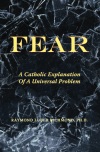 |
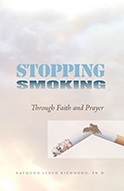 |
 |
 |
 |
A Catholic Perspective
On Behavioral Change
and Its Subversion |
A Catholic Explanation
Of a Universal
Problem |
Through
Faith
and
Prayer |
Healing
the
Rage |
When They Tell You
That the Moral Teachings of the
Catholic Church
Are Wrong |
Reverent and
Proper Conduct in
a Catholic Church |
More information |
More information |
More information |
More information |
More information |
More information |
|




